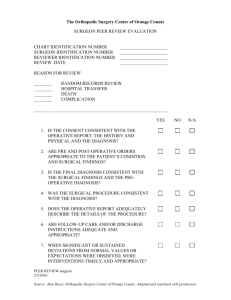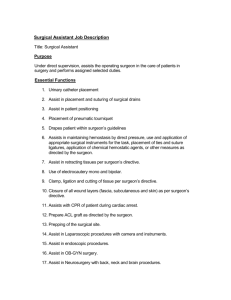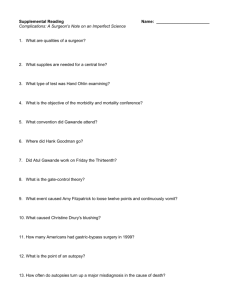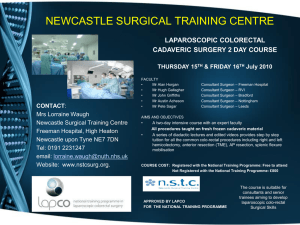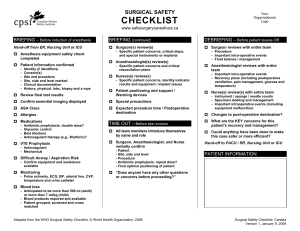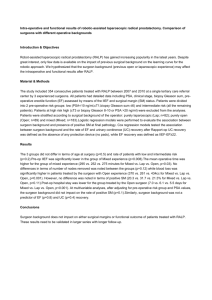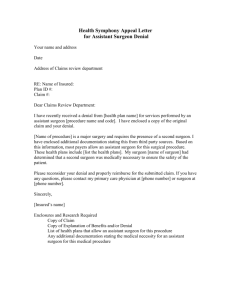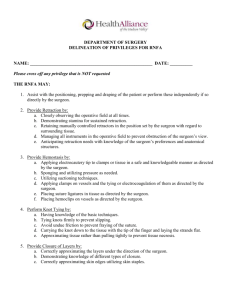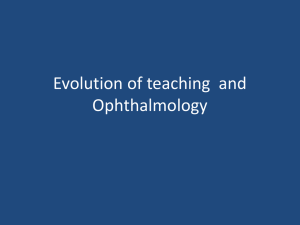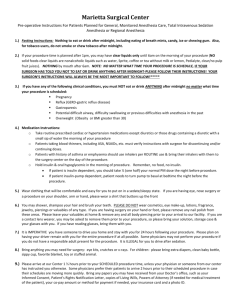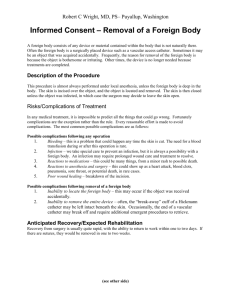5157 Assist with animal surgery as a surgical veterinary nurse
advertisement
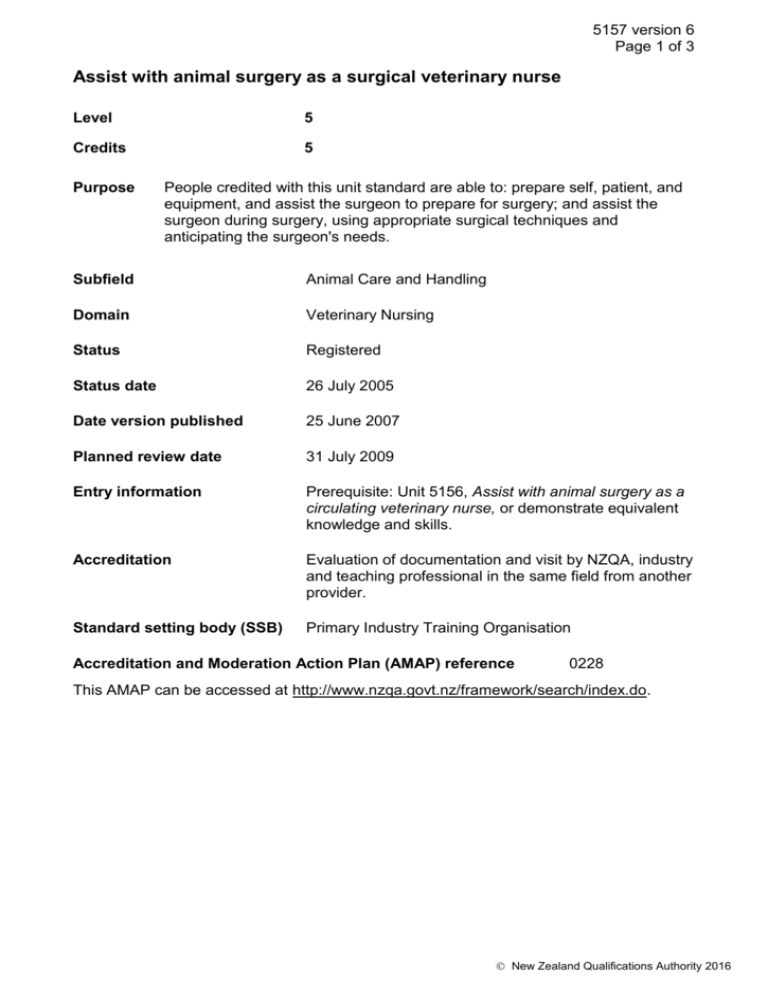
5157 version 6 Page 1 of 3 Assist with animal surgery as a surgical veterinary nurse Level 5 Credits 5 Purpose People credited with this unit standard are able to: prepare self, patient, and equipment, and assist the surgeon to prepare for surgery; and assist the surgeon during surgery, using appropriate surgical techniques and anticipating the surgeon's needs. Subfield Animal Care and Handling Domain Veterinary Nursing Status Registered Status date 26 July 2005 Date version published 25 June 2007 Planned review date 31 July 2009 Entry information Prerequisite: Unit 5156, Assist with animal surgery as a circulating veterinary nurse, or demonstrate equivalent knowledge and skills. Accreditation Evaluation of documentation and visit by NZQA, industry and teaching professional in the same field from another provider. Standard setting body (SSB) Primary Industry Training Organisation Accreditation and Moderation Action Plan (AMAP) reference 0228 This AMAP can be accessed at http://www.nzqa.govt.nz/framework/search/index.do. New Zealand Qualifications Authority 2016 5157 version 6 Page 2 of 3 Special notes 1 For credit, evidence must be in accordance with the statutory and industry requirements contained in the following documents. Relevant and current National Animal Welfare Advisory Committee (NAWAC) Codes of Welfare and Codes of Recommendations and Minimum Standards, available at http://www.maf.govt.nz, under animal welfare. Relevant New Zealand Veterinary Association (NZVA) standards, available from NZVA, PO Box 11-212, Manners Street, Wellington (http://www.vets.org.nz) including the current versions of Standard Procedures for Veterinary Nursing and Animal Care, BESTPRACTICE™ Standards for Companion Animal and Large Animal Combined Module for Mixed Practices. Animal Welfare Act 1999, Health and Safety in Employment Act 1992, and any subsequent amendments. 2 Definitions Surgical veterinary nurse refers to a sterile theatre assistant. In-house procedures refer to the documented policies and procedures for animal care, handling, and ethical behaviour codes required by the employer, consistent with NZVA BESTPRACTICE™ standards. Elements and performance criteria Element 1 Prepare self, patient, and equipment, and assist the surgeon to prepare for surgery. Performance criteria 1.1 Equipment required for specific procedure being performed is prepared using aseptic technique and according to in-house procedures. 1.2 Surgeon is assisted to gown and glove maintaining asepsis. 1.3 Surgical scrub, gowning, and gloving are performed for self using aseptic technique. 1.4 Patient is draped using aseptic technique and according to type of surgery. Element 2 Assist the surgeon during surgery, using appropriate surgical techniques and anticipating the surgeon’s needs. Performance criteria 2.1 Commonly used surgical instruments are identified, and described in terms of their function. Range haemostats, retractors, needle holders, scissors, forceps, towel clamps. New Zealand Qualifications Authority 2016 5157 version 6 Page 3 of 3 2.2 Duties involving handling instruments are anticipated and carried out as directed by the surgeon. Range 2.3 passing, cleansing, assembly as appropriate, tray maintenance, holding, removing. Duties involving swabbing are carried out as directed by the surgeon, and as anticipated, according to the surgeon’s needs. Range may include but is not limited to – wet and dry swabbing, irrigation, organ packing, counting swabs, suction. 2.4 Access is maintained to surgical field or site using retraction, as directed by the surgeon, and as anticipated, according to the surgeon’s needs. 2.5 Suturing methods and patterns are described in terms of their use for particular procedures. 2.6 Duties involving suturing are carried out as directed by the surgeon. Range selection of suture materials, cutting sutures, selection of needles. Please note Providers must be accredited by NZQA, or an inter-institutional body with delegated authority for quality assurance, before they can report credits from assessment against unit standards or deliver courses of study leading to that assessment. Industry Training Organisations must be accredited by NZQA before they can register credits from assessment against unit standards. Accredited providers and Industry Training Organisations assessing against unit standards must engage with the moderation system that applies to those standards. Accreditation requirements and an outline of the moderation system that applies to this standard are outlined in the Accreditation and Moderation Action Plan (AMAP). The AMAP also includes useful information about special requirements for organisations wishing to develop education and training programmes, such as minimum qualifications for tutors and assessors, and special resource requirements. Comments on this unit standard Please contact the Primary Industry Training Organisation standards@primaryito.ac.nz if you wish to suggest changes to the content of this unit standard. New Zealand Qualifications Authority 2016
